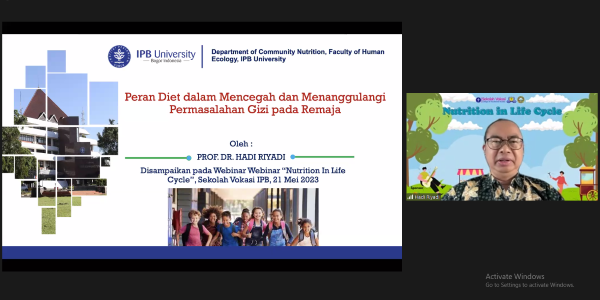IPB University Expert Reviews Diet Solution for Teenagers: Efforts to Lower Eating Disorder Cases

The issue of nutrition in adolescents increasingly requires serious focus. Teenagers’ ambition for body image to have perfect body proportions can have a negative impact. One of them causes some teenagers to do everything they can to keep their bodies looking perfect.
However, without the right knowledge about dieting, teenagers can experience malnutrition. Not infrequently, teenagers do diets that are too extreme such as not eating carbohydrates or even only eating fruits and vegetables and using slimming drugs. As a result, cases of eating disorders in adolescents are increasingly occurring.
The need for education on adolescent nutrition encourages collaboration between lecturers and students of IPB University Vocational School from the Management of Food and Nutrition Services Industry (MIJMG) Study Program to create national nutrition webinar activities with a big theme, namely ‘Nutrition in Life Cycle’. This webinar discusses adolescent nutrition problems, eating disorders, proper diet implementation, and mindful eating.
Prof Hadi Riyadi, Professor of Community Nutrition Science at IPB University as a guest speaker, explained nutritional problems in adolescents and their impact on impaired brain development, increased risk of non-communicable diseases (NCDs), low academic potential, low productivity, and low pregnancy outcomes.
“The need for balanced nutrition for adolescents is very important, especially during their growth period. The nutrients needed are not only macronutrients but also micronutrients that suit the needs of these adolescents,” he explained.
In addition, continued Prof Hadi, no less important is the application of a healthy diet or diet for adolescents with the right intake of energy, vegetable protein, iron, calcium, fluids, and milk as needed. Physical activity, habitual breakfast, or morning meals are also needed as a companion to a healthy diet.
Meanwhile, Dr Frima Elda, a nutrition and health specialist explained three types of eating disorders that are often experienced by teenagers as a result of the desire to have an ideal body. The types in question include anorexia, bulimia nervosa, and binge eating or overeating.
“Anorexia is an appetite disorder. Bulimia nervosa is inappropriate and too extreme compensatory behavior such as trying to vomit food both in large and small quantities,” she explained.
As for binge eating, she said, it is when people have a big urge to eat so that they can consume a lot of food at one time. According to her, this can cause a person to suffer from other degenerative diseases such as obesity, diabetes, and high blood pressure.
“Well-nourished adolescents are the nation’s assets and investments in efforts to prevent stunting and reduce maternal and child mortality,” she concluded. (*/SMH/Rz) (IAAS/TNY)



